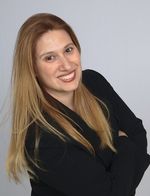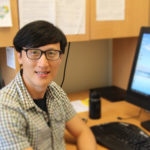Hebrew Lessons Through 4-VA@Mason Shared Courses: Opening a New World for a Range of Students
With a wide breadth of experience teaching Hebrew in a variety of settings, in person, online —  synchronous and asynchronous – and hybrid, Dr. Aharona Rosenthal came to Mason eminently prepared to slip easily into the role of a 4-VA@Mason Shared Courses professor. After starting teaching at Mason in the Fall of 2020, the department asked her if she would be amenable to also teach students at Virginia Tech. “They asked me if it’s OK with me that Virginia Tech join us. I was fine with opening my class to the Tech students, I’m happy to combine it and open my classes to anyone interested!” Today, Rosenthal continues the decade long program through 4-VA to offer shared courses to other schools in the collaborative, as 4-VA financially supports the department’s hire of the faculty member. Although the 4-VA Shared Courses have been predominantly focused on language, there have been other types of courses included in the offerings.
synchronous and asynchronous – and hybrid, Dr. Aharona Rosenthal came to Mason eminently prepared to slip easily into the role of a 4-VA@Mason Shared Courses professor. After starting teaching at Mason in the Fall of 2020, the department asked her if she would be amenable to also teach students at Virginia Tech. “They asked me if it’s OK with me that Virginia Tech join us. I was fine with opening my class to the Tech students, I’m happy to combine it and open my classes to anyone interested!” Today, Rosenthal continues the decade long program through 4-VA to offer shared courses to other schools in the collaborative, as 4-VA financially supports the department’s hire of the faculty member. Although the 4-VA Shared Courses have been predominantly focused on language, there have been other types of courses included in the offerings.
When the 4-VA Shared Courses program began, however, teaching online was the exception to the rule, however since the pandemic, it has become ubiquitous. “I find that online and hybrid teaching is great,” says Rosenthal. “There are so many resources I can point to and have student practice at their own pace.”
Continues Rosenthal, “There are great apps that support teaching Hebrew and practicing Hebrew, and I’ll say, ‘go into that app,’ and each student can individually test themselves and practice on their own according to their own pace. Some students will still stay on the first step and practice it repeatedly. Others feel very comfortable and keep moving ahead.”
Another aspect of the 4-VA course that Rosenthal enjoys is the range of students with different backgrounds and levels of understanding Hebrew. Some have been to Hebrew school, others have parents or grandparents who speak the language, while still others have no prior knowledge of the language. She has also had students auditing the class and some older students who have recently retired — just interested in learning the language for fun. She notes that other professors have even attended the course. “My goal is to be flexible and approachable to everybody,” she explains.
In addition to honing her skills in the Mason 4-VA program, Rosenthal is the Judaic Studies Director at University of Maryland, Baltimore County, where she’s been teaching for 13 years. She is also teaching at Yeshiva University. Rosenthal grew up in Israel, where she received her bachelor’s and master’s degrees, and obtained her PhD from Gratz College.
—————————————————————————————————————————————————————-
The immersive experience in the Telepresence rooms throughout the 4-VA system provided one of first collaborative efforts between campuses at the inception of the program. Using this technology, Mason students are able to take classes offered at other schools, while Mason faculty teach classes which are delivered to students enrolled at 4-VA partner universities.
Teaching Korean, With a Twist

As a long-time instructor in the Korean language Dae Yong Kim has faced his share of teaching challenges – early in his career at the Defense Language Institute English Language Center in Monterrey, Calif. and later, at a New York City high school. So, when he arrived on the Mason campus two years ago, he quickly settled into a more predictable routine. That, he thought, would change when he was asked to teach Korean not only to his students on the Mason campus, but also to students on the campus at James Madison University, a 4-VA partner school 116 miles to the southwest, via the 4-VA Telepresence Room.
Shared courses, like the one that Kim would go on to teach, are one of the pillars of the 4-VA partner institutions. “The ability to offer shared courses like Korean is an important goal for reducing faculty costs and expanding course opportunities for our students,” explains Mason’s 4-VA Campus Coordinator Janette Muir.
After getting a feel for the room and the dynamics, Kim realized he had to make some modifications in his teaching style and in the class materials. “I spent a lot of time thinking up how to change the classroom to make it interesting and challenging,” explains Kim.
“I quickly recognized I had to make some changes in everything from the font size on my PowerPoint slides to how I engage my students, especially the ones at JMU,” said Kim. So Kim got to work, enlarging the font and minimizing the content on the slides.
His next step was to change his style, “You can’t do lecture style teaching in the Telepresence Room, I have to engage the class. I decided that I had to focus on the JMU students, because I’ve already got the attention of my students here. But they can’t spend one hour and 15 minutes staring at the monitor. Now, I do more group activities like have the students interview their peers and then we all analyze the interview as a class.”
Kim’s next hurdle was to figure out how to handle quizzes — the backbone of a language class, to ensure that students are retaining their vocabulary. But conducting such quizzes, fairly, 100+ miles away would be difficult. To overcome this, Kim gives each of the students at JMU different vocab tests and each choose their correct answers amongst responses provided. Once a student selects the right answer, they record it in a notebook. When they complete their notebook response sheet, the student takes a picture of page and emails it to Kim. Kim monitors his phone throughout the allotted quiz time to ensure that he has received each student’s quiz.
After concluding his first year in the Telepresence Room, teaching a class in the 2018 Fall Semester and the 2019 Spring Semester, Kim is impressed with the results.
“I honestly thought students would drop the class after one or two sessions, I thought they’d find it too difficult to follow,” says Kim. But the students proved him wrong. They all stayed engaged and worked hard throughout the course. What’s more, Kim reports, “As an experienced Korean teacher, I know what their proficiency level should be at the end of the semester and what they need to do to achieve that level. I was surprised to see that there was not a drop off in proficiency at all!”
Fall 2023
Elementary Hebrew I
HEBR 101 – DL1
CRN: 74687
Instructor: Aharona Rosenthal
Hosted by Mason: Shared with Virginia Tech
Spring 2023
Elementary Hebrew II
HEBR 102 – VD1
CRN: 14622
Tuesday/Thursday
2:00 – 3:15 p.m.
Taught online
Instructor: Dr. Aharona Rosenthal
Intermediate Hebrew II
HEBR 202 – VD1
CRN: 21320
Taught online, asynchronously
Instructor: Dr. Aharona Rosenthal
Hosted by Mason: Shared with Virginia Tech
Fall 2022
Elementary Hebrew 1
HEBR 101 – DL1
TR 2:00 p.m. – 3:15 p.m.
Hosted by Mason: Shared with Virginia Tech
Instructor: Dr. Aharona Rosenthal
Spring 2022
Elementary Hebrew II
HEBR 102-V01
TR 2:00 p.m. – 3:15 p.m.
Hosted by Mason: Shared to Virginia Tech
Instructor: Dr. Aharona Rosenthal
Spring 2021
Intermediate Portuguese
PORT 202 -DL1
Asynchronous
Hosted by Mason: Shared to James Madison
instructor: Tatiana Queenen
Fall 2020
Elementary Hebrew I
HEBR 101-DL1
TR 2:00 – 3:15 p.m.
Hosted by Mason: Shared to Virginia Tech
Instructor: Aharona Rosenthal
Intermediate Portuguese
PORT 101 -DL1
Asynchronous
Hosted by Mason: Shared to James Madison
Instructor: Tatiana Queenen
Spring 2020
Intermediate Hebrew I
HEBR 201-DL1
Asynchronous
Hosted by Virginia Tech: Shared to Mason
Instructor: Michal Kahanovitch
Fall 2019
Elementary Hebrew 1
HEBR 101-V01 –CRN: 81987
TR 2:00 – 3:15 p.m., Merten 3001
Hosted by Virginia Tech: Shared to Mason
Instructor: Michal Kahanovitch
Spring 2019
KORE 102-V01 – Intermediate Korean
CRN: 22210
TR 10:30 – 11:45 a.m., Merten 3001
Hosted by Mason: Shared to James Madison University
Instructor: Dae Yong Kim
KORE 102-V02 – Intermediate Korean
CRN: 22195
TR 12:00 – 1:15 p.m., Merten 3001
Hosted by Mason: Shared to James Madison University
Instructor: Dae Yong Kim
PERS 210-V01 – Intermediate Persian
CRN: 20623
MW 9:00 – 10:15 a.m., Engineering 2903
Hosted by Mason: Shared to James Madison University
Instructor: Maziar Valamotamed
PERS 330 – V03 – Advanced Persian I
CRN: 18756
MW 10:30 – 11:45 a.m., Engineering 2903
Hosted by Mason: Shared to James Madison University
Instructor: Maziar Valamotamed
Fall 2018
PERS 110 – V02 – Elementary Persian
6 credits
Hosted by Mason: Shared to James Madison University
Instructor: Maziar Valamotamed
PERS 202 – V01 – Intermediate Persian II
3 credits
Hosted by Mason: Shared to James Madison University
Instructor: Maziar Valamotamed
FREN 391 – V01 – French for the Business World
3 credits
Hosted by Old Dominion University: Shared to Mason
Instructor: Peter Schulman
HIST 535 – V01/635- V01 – France’s Decolonized Legacy
3 credits
Hosted by Old Dominion University: Shared to Mason
Instructor: Peter Schulman
KORE 101 – VO1 Elementary Korean
3 credits
Hosted by Mason: Shared to James Madison and Virginia Tech
Instructor: Dae Yong Kim
